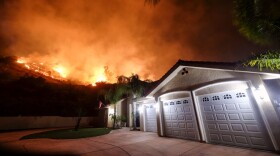Two representatives from our region are seeking to revoke presidential powers to designate national monuments and historic landmarks. Indigenous communities caution the effort could remove a safeguard for sacred lands and pave the way for development.
Republican Representatives Mark Amodei of Nevada and Celeste Maloy of Utah have introduced a bill called the Ending Presidential Overreach on Public Lands Act, which they say is about fairness. The legislation would overturn a “one-sided approach on major land management decisions,” according to a statement on Amodei’s website. It would do so by striking a section from the Antiquities Act of 1906.
The bill proposes stripping the president of the power to designate national monuments and historic landmarks and giving that power solely to Congress. “This legislation overturns years of a one-sided approach on major land management decisions and ensures Western communities are given a seat at the table for any future monument designations,” Amodei states.
Indigenous advocates argue the measure would remove a safeguard for sacred lands.
Mathilda Guerrero-Miller with Native Voters Alliance of Nevada sees the bill as an attempt to turn lands over to private interests.“What this bill is trying to do is prevent more uses and protections of sacred spaces — all to protect and to better corporate greed for housing and development,” Guerrero-Miller said.
“Congress trusted Presidents with a narrow authority to declare national monuments in the Antiquities Act,” Maloy said in a statement. “Unfortunately, Presidents have continued to abuse that narrow authority to designate millions of acres of land in Utah and across the West without proper Congressional oversight.”
Guerrero-Miller countered this by noting that Congress already has a role in the process, and designating land as a national monument takes decades of effort and input from the community. As an example, she points to the 2023 designation of Avi Kwa Ame National Monument in Nevada. Also known as Spirit Mountain, it is considered sacred to many Tribal Nations.
Guerrero-Miller said some bills are purposely written to deceive their true intent. The details of Amodei and Maloy’s bill, she said, show that “they’re not actually interested in protecting what you wanted. They’re mostly interested in protecting their political agenda.”
The Antiquities Act of 1906 was signed into law by President Theodore Roosevelt, who designated the Grand Canyon National Park in 1908. Since then, it has been used more than 300 times by presidents from both political parties.
During his first administration, Trump scaled back the acreage on the Grand Staircase-Escalante and Bears Ears National Monument in Utah. Biden restored them. Biden also designated one of the country’s newest national monuments, Avi Kwa Me in Nevada.
Senator Jacky Rosen announced, this week, she is re-introducing the Truckee Meadows Public Lands Management Act, also known as the Washoe County Lands Bill. The bill is intended to expand economic development opportunities and make more land available for housing in Washoe County and to support local Tribal communities as well as increase access to outdoor recreation and protect public lands,” according to her news release.
Accessing public lands for affordable housing was a topic of discussion during the Western Governor’s recent meeting in Las Vegas.
This story was produced by the Mountain West News Bureau, a collaboration between Wyoming Public Media, Nevada Public Radio (KNPR) in Las Vegas, Boise State Public Radio in Idaho, KUNR in Nevada, KUNC in Colorado and KANW in New Mexico, with support from affiliate stations across the region. Funding for the Mountain West News Bureau is provided in part by the Corporation for Public Broadcasting.










